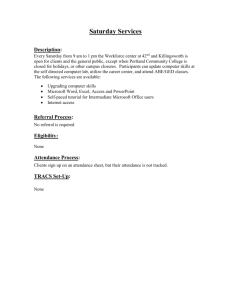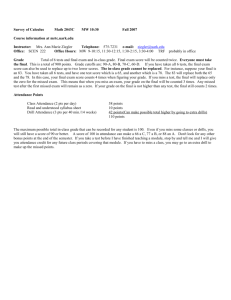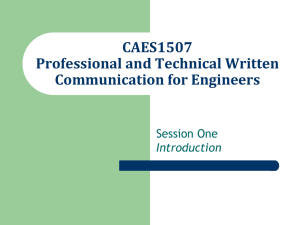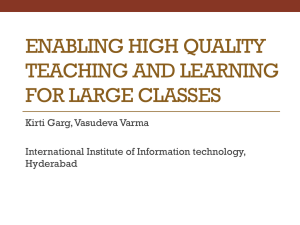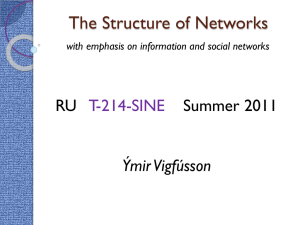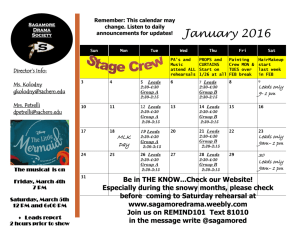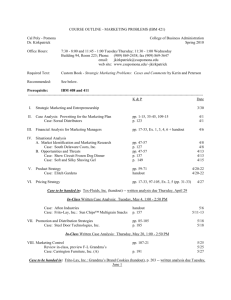English for Academic Purposes - Johns Hopkins Bloomberg School
advertisement
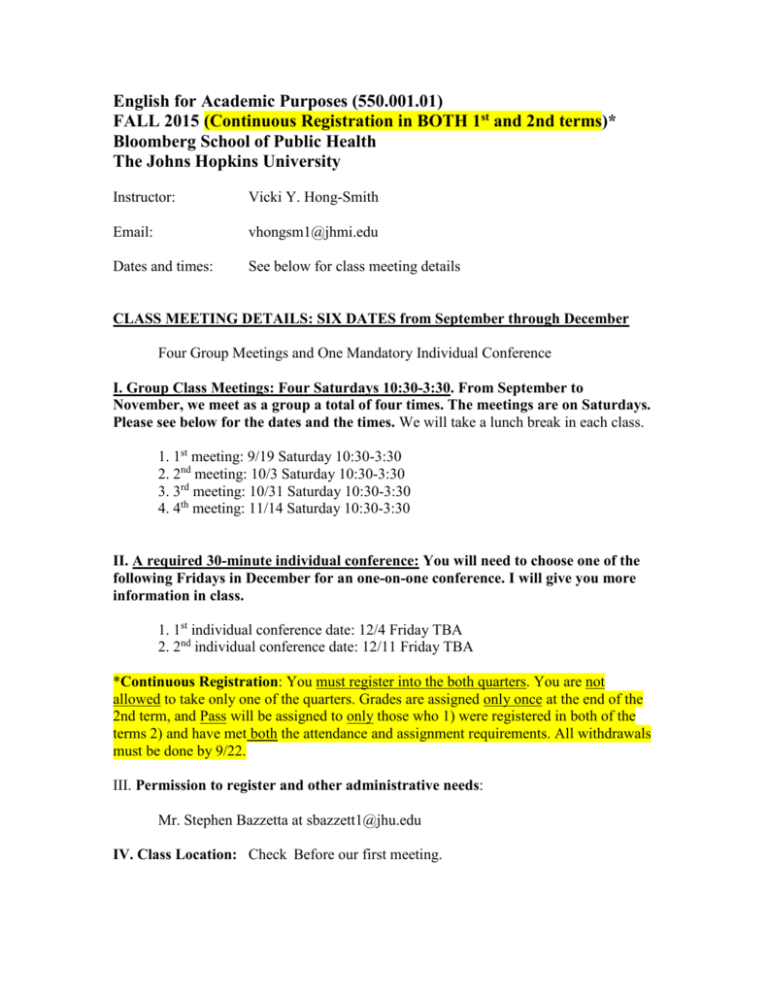
English for Academic Purposes (550.001.01) FALL 2015 (Continuous Registration in BOTH 1st and 2nd terms)* Bloomberg School of Public Health The Johns Hopkins University Instructor: Vicki Y. Hong-Smith Email: vhongsm1@jhmi.edu Dates and times: See below for class meeting details CLASS MEETING DETAILS: SIX DATES from September through December Four Group Meetings and One Mandatory Individual Conference I. Group Class Meetings: Four Saturdays 10:30-3:30. From September to November, we meet as a group a total of four times. The meetings are on Saturdays. Please see below for the dates and the times. We will take a lunch break in each class. 1. 1st meeting: 9/19 Saturday 10:30-3:30 2. 2nd meeting: 10/3 Saturday 10:30-3:30 3. 3rd meeting: 10/31 Saturday 10:30-3:30 4. 4th meeting: 11/14 Saturday 10:30-3:30 II. A required 30-minute individual conference: You will need to choose one of the following Fridays in December for an one-on-one conference. I will give you more information in class. 1. 1st individual conference date: 12/4 Friday TBA 2. 2nd individual conference date: 12/11 Friday TBA *Continuous Registration: You must register into the both quarters. You are not allowed to take only one of the quarters. Grades are assigned only once at the end of the 2nd term, and Pass will be assigned to only those who 1) were registered in both of the terms 2) and have met both the attendance and assignment requirements. All withdrawals must be done by 9/22. III. Permission to register and other administrative needs: Mr. Stephen Bazzetta at sbazzett1@jhu.edu IV. Class Location: Check Before our first meeting. V. Required Textbook: Quick Access Compact, Lynn Q. Troyka & Douglas Hesse, Pearson Publishing Company—Buy a used copy from online vendors. I saw copies selling for a few dollars. Do not worry about not getting an access code for buying a used copy. Please buy before our first meeting to bring to class. Please use the URL below to view the edition I prefer. I have heard in the past this particular edition was not always available. In that case, buy an edition that came out after 2007. Some of the contents may have changed, but the main bulk of them should be pretty much the same. I will be using the book for mainly outside the classroom reading and reinforcement. You must have the book for this class. http://www.textbooks.com/Quick-Access-Compact-Handbook-07Edition/9780205664702/Troyka.php COURSE DESCRIPTION This course is for students whose first language is not American English and whose experience with academic written communication in American English is limited. This course focuses on a number of aspects of effective academic written communication to help the student write as clearly as possible. In each class, while addressing specific major topics, I will be working on various grammar and writing points helpful for students whose first language is not English or whose educational medium language was not U.S. academic English. COURSE OBJECTIVES Upon completion of this course, students will be able to Apply strategies used in the three main stages of the Writing Process. Spiral strategies include brain storming, outlining, drafting, proofreading, rewriting and editing. Formulate an effective thesis statement Support thesis with concrete supporting details Avoid global errors such as fragments, run-on/splice sentences, dangling modifiers Avoid errors in tenses and agreements Correctly incorporate quotation, summary, and paraphrase when citing outside sources Correctly apply required parenthetical documentation and bibliographical documentation format Apply fundamental speech delivery skills for a short oral presentation REQUIREMENTS: There are five parts in this section. Please read carefully. 1. Permission to register: Mr. Stephen Bazzetta: sbazzett1@jhu.edu 2. Four In-class Writing Assignments: After lunch in each class, we will have in-class writing. You will write on a given prompt to apply the skills we cover during the morning session. It may be an individual or a small-group activity. More details will be shared in class. After the in-class writing activity, I will do a wrap-up of some common needs and specific challenges found in the samples. 3. Two Take-home Writing Assignments: As one part toward the passing grade, you will revise, complete and submit TWO of the in-class writing drafts. The writing submissions will not be graded, but two samples from the in-class writing must be submitted as part of a passing grade. I will give you feedback on the submissions. 4. One short oral presentation: At the three latter meetings, you will give a 10-minute oral presentation to connect formal communication in a written form and a verbal form. Details about the oral presentation will be given in class along the way. This is a low key, ungraded activity. You give only one presentation on one of the three dates, but you must participate in the oral presentation to receive a passing grade. 5. Attendance: Attendance is required as part of your course grade. One absence of the group meetings is allowed for the class. In addition, you may miss your individual conference if there are unavoidable excuses. Please let me know ahead of the scheduled conference. If you miss more than one group meeting or miss more than one group and your individual meeting, you will receive a fail grade even though you may have submitted the writing assignments and have given an oral presentation. PLEASE take the attendance requirement seriously. Habitual tardiness and/or routine early departures will also count as absences. FINAL GRADE: Non-credit pass or fail Your final grade will be a P (Pass) or an F (Fail). Meeting the above attendance and assignment (written and oral) requirements will result in a passing grade. ACADEMIC HONESTY: PLAGIARISM Plagiarism is cheating. In this class, using another person’s words or ideas as your own without giving credit, producing a memorized piece (either your own or someone else’s), or having someone do any portion of your work is cheating. You are expected to complete your own, original work. You may find (or have found) that academic institutions in the U.S. use a different definition from many parts of the world for what constitutes academic dishonesty. I will cover this topic, give you an application assignment, and answer your questions regarding this very important issue. For specific policies, refer to your student resource handbook/CD. TOPICS The following are the main topics to be covered in the indicated meeting. However, other related topics and writing issues will be addressed. Adjustments may be made as needed. Chapters from the textbook relevant to the topics will be assigned before and/or after the meetings. As stated earlier, there will be in-class writing every session. 1st meeting: 9/19 General aspects of academic written communication Overview of Academic Communication/U.S.-specific aspects/Formal writing structure/ Writing Process/ Organizational techniques Frequent grammar and writing concerns for academic writers Fundamental concerns about plagiarism: cultural expectations in the U.S. Introductions and overview of plagiarism: types and consequences 2nd meeting: 10/3 Review and reinforcement of the previous objectives Avoiding plagiarism: U.S. expectations Quote, Summary, Paraphrase & Synthesis Documentation styles and requirements APA and others / In-text and end lists Application of documentation and citation Oral presentations 3rd meeting: 10/31 Intensive focus on a range of grammar, mechanical and writing issues for learners of English for academic communication Frequent errors/Unusual features in English usage/ Corrective strategies Intensive focus on verb tenses and conditionals Oral presentations 4th meeting: 11/14 Wrap –up Oral presentations 5th and 6th meetings; 12/4 or 12/11. Individual conferences. PLEASE NOTE they are on FRIDAYS. You will be asked to sign up for one of the dates.


